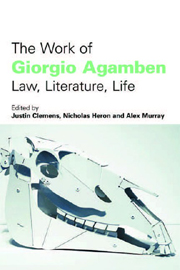Book contents
- Frontmatter
- Contents
- Acknowledgements
- Notes on Contributors
- The Enigma of Giorgio Agamben
- 1 K
- 2 Integral Actuality: On Giorgio Agamben's Idea of Prose
- 3 The Role of the Shifter and the Problem of Reference in Giorgio Agamben
- 4 ‘Its Silent Working was a Delusion’
- 5 Politics and Poetics of Divine Violence: On a Figure in Giorgio Agamben and Walter Benjamin
- 6 Idea of Poetry, Idea of Prose
- 7 The Fading Memory of Homo non Sacer
- 8 Soulblind, or On Profanation
- 9 Face to Face with Agamben; or, the Other in Love
- 10 Beyond Spectacle and the Image: the Poetics of Guy Debord and Agamben
- 11 Dismantling Theatricality: Aesthetics of Bare Life
- 12 Notes on Media and Biopolitics: ‘Notes on Gesture’
- Index
6 - Idea of Poetry, Idea of Prose
Published online by Cambridge University Press: 12 September 2012
- Frontmatter
- Contents
- Acknowledgements
- Notes on Contributors
- The Enigma of Giorgio Agamben
- 1 K
- 2 Integral Actuality: On Giorgio Agamben's Idea of Prose
- 3 The Role of the Shifter and the Problem of Reference in Giorgio Agamben
- 4 ‘Its Silent Working was a Delusion’
- 5 Politics and Poetics of Divine Violence: On a Figure in Giorgio Agamben and Walter Benjamin
- 6 Idea of Poetry, Idea of Prose
- 7 The Fading Memory of Homo non Sacer
- 8 Soulblind, or On Profanation
- 9 Face to Face with Agamben; or, the Other in Love
- 10 Beyond Spectacle and the Image: the Poetics of Guy Debord and Agamben
- 11 Dismantling Theatricality: Aesthetics of Bare Life
- 12 Notes on Media and Biopolitics: ‘Notes on Gesture’
- Index
Summary
1. It has long been the tendency of critics to treat Walter Benjamin's doctoral dissertation on ‘Der Begriff der Kunstkritik in der deutschen Romantik’, which was first published as a monograph in 1920, as something of an anomaly within his often fragmentary, but nonetheless vast body of work. And, at a first, provisional glance, this indeed appears to be the case. It was the first – and, to be sure, the last – of his writings to be conceived and accommodated entirely within the parameters of the university. Its successful defence before the faculty of philosophy at the University of Bern in June of 1919 was the only academic recognition Benjamin would ever receive. With its mannered academic style, its employment of a rigorous scholarly apparatus and its fierce anonymity with respect to its own critical intervention (all of which would, ultimately, be abandoned), it would appear to represent something like a momentary compromise, within the spectrum of his writings, to adhere to the strict disciplinary requirements that the shadow of this circumstance inevitably cast across his work.
This is the position maintained, for example, by Philippe Lacoue-Labarthe in the preface to his 1986 translation of the essay into French, who, through the patient examination of Benjamin's letters from the same period and on the basis of the sharp distinction that he traces between Benjamin's own theory of writing and the necessarily conventional nature of the dissertation, advances the following, striking conclusion: that it was not by chance that the very text which took Benjamin the furthest away from his own working method would be dedicated to precisely the school of thinking, the early Romantics, from which that method was largely drawn.
- Type
- Chapter
- Information
- The Work of Giorgio AgambenLaw Literature Life, pp. 97 - 113Publisher: Edinburgh University PressPrint publication year: 2008



